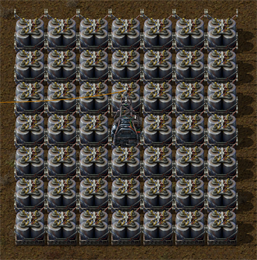Electric system
The Electric network is used to power a lot of different machines; the game can hardly be played without using Electricity. Every machine has its own internal electric capacity. When energy is produced, it is evenly distributed to all machines in the network that need electricity.
Beginner
Generators
| Steam engine | The Steam engine consumes heated water to generate energy. Boilers are used to heat the water consuming Fuel. Pumps are used to emerge water from the sea. |
| Solar panel | Solar Panels generate a small amount of energy only at daylight. They require a lot of material and research but provide electrical energy without consuming Fuel or producing pollution. |
Storage
| Basic accumulator | Stores and provides electrical energy. |
| Storage tank | Storage tanks can be used to store steam for later consumption by Steam engines. |
Distribution
| Item | Total raw | Coverage area | Own size | Absolute / Effective coverage (in Tile) | Cov. rel. to small el. pole | Wire reach |
|---|---|---|---|---|---|---|
| Small electric pole | 5 x 5 | 1 x 1 | 25 / 24 | 100% | 8 | |
| Medium electric pole | 7 x 7 | 1 x 1 | 49 / 48 | 196% | 9 | |
| Big electric pole | 4 x 4 | 2 x 2 | 16 / 12 | 65% | 30 | |
| Substation | 14 x 14 | 2 x 2 | 196 / 192 | 784% | 14 | |
| Copper cable | Wire reach depends on joined poles | |||||
Connection
For connecting a generator with a consumer both items need to be in a powered area of the same electric network. Electric poles create an covered area of different size around them. If placed close enough two poles connect and form a network. An item is 'connected' as soon as one block is in an covered area. Each electric pole has a GUI providing information about the whole electric network. When hovering a pole you get an overall satisfaction bar in the tooltip.
- Use shift-click on a existing pole to remove its connections to other poles
- Unconnected poles can be connected with a single Copper cable dragging from pole to pole (Right click on the bottom of the pole.)
- You can use place-key (default left mouse) while running/driving, to auto-place poles.
More info

The power demand of a network will be fed by power sources in a specific order. If the primary source cannot fully satisfy the demand, additional power is drawn from the second source and so on until no more sources are available. The current order (version 0.9.8) is the following:
With this order in mind, it is common to charge accumulators with Solar panels during the day and to use the stored energy of accumulators overnight automatically.
A newly-placed electric pole will be automatically connected to nearby poles according to the following rules:
- It will be connected to the closest pole available
- It won't be connected to 2 poles connected to each other (ie. it won't form a 3 pole triangle)
- It will be connected to other available poles, starting with the closest ones
Copper cable can be used to manually connect 2 poles. This will use up the wire, which can't be later retrieved. Default placement mode doesn't use up wires.
Belts and all other entities can be placed in masses by keep pressing the place key, and this works for power poles too: Hold place-key (default left mouse button) to set the first pole. With the button held down, run in any direction. The next pole is placed at the farthest point and connects to the previous, eliminating the need for micromanagement of pole placement.
This works also from a car or train, which enables you to place the electric poles very quickly!
Advanced
See also
- Electricity/Priority of power Production
- Powering sequence - the order in which accumulators are loaded. This is also about how the electric network orders internally new networks.
- How to switch off steam engines in the night, when enough accumulator capacity is available?
- Electricity
- Liquid
- Units